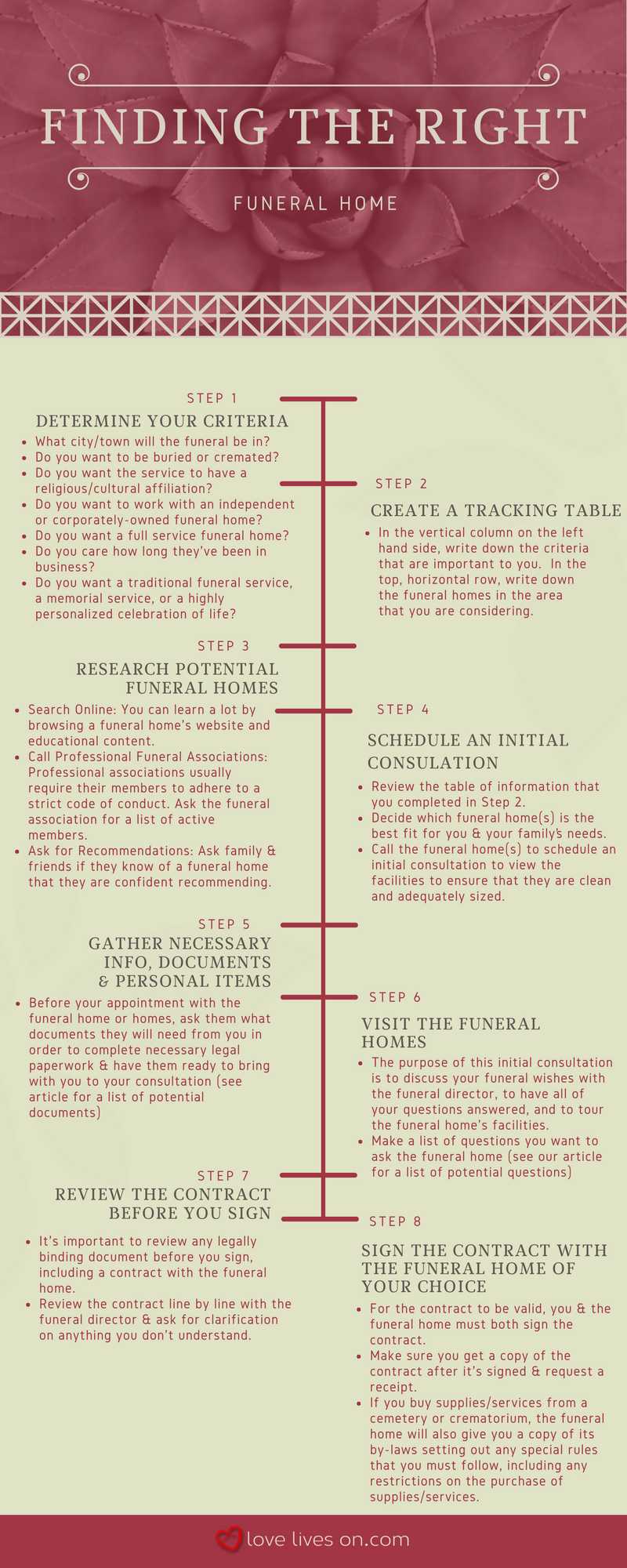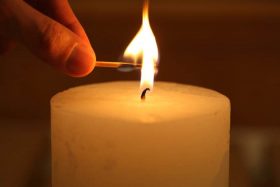Selecting a funeral home that is professional, knowledgeable, caring, and who will listen to your input, is important to you and your family.
A reputable funeral home will provide much needed support during a time of need, and help create a service that truly honours a person’s life and legacy.
In this essential checklist on how to choose a funeral home, we cover everything you need to know before signing a contract, including:
- Questions to ask when choosing a funeral home
- What makes a good funeral director
- What to look for in the funeral home contract before you sign.
We have prepared this essential checklist to help you find and choose a funeral home that best meets your needs.
We have also summarized each step into a helpful infographic that you can save to one of your Pinterest boards or share on social media.
1. Determine Your Criteria for Choosing a Funeral Home
There are some important issues to consider before you begin your search for a funeral home. Ask yourself:
- What city or town will the funeral take place in? (This will narrow your search parameters.)
- Do I want to be buried? If yes, do I want to only work with a funeral home that operates its own cemetery?
- Do I want to be cremated? If yes, do I only work with a funeral home that operates its own crematorium?
- Do I want to only work with funeral homes that have a particular religious or cultural affiliation?
- Do I prefer to work with an independently owned funeral home instead of a corporation owned home?
- Do I only want to work with a full service funeral home?
- Does it matter to me how long the funeral home has been in business?
- Do I want a traditional funeral service, or a memorial service, or a highly personalized celebration of life?
2. Create a Table to Track Your Research Findings
Create a table that you can use to keep track of the information that you find during your research efforts.
In the vertical column on the left hand side, write down the criteria that are important to you. In the top, horizontal row, write down the funeral homes in the area that you are considering. For example:
|
ABC Funeral Home |
XYZ Funeral Home |
Acme Funeral Home |
|
|
Offers Cremation |
|||
|
Owns a crematorium |
|||
|
Family owned home |
|||
|
In business for at least 10 years |
|||
|
Will cater for personalized life celebration |
3. Research Funeral Homes in Your Local Area
There are several methods for finding reputable funeral homes:
- Search Online: In our digital age, this is the most common method for researching funeral homes in the area. You can learn a lot by browsing a funeral home’s website and educational content. You should be able to find the answers to many of the questions posed in Step 1 (above).
- Phone Professional Funeral Associations: Professional associations usually require their members to adhere to a strict code of conduct. Ask the funeral association for a list of active members (if they don’t have this list on their website).
- Ask for Recommendations: Ask family and friends if they know of a funeral home that they are confident recommending.
Throughout the course of your research, put a tick mark or a cross in each square of your research table (see Step 2 above). If you are unable to find answers to certain questions online, call the funeral home and ask.
4. Schedule an Initial Consultation at the Funeral Home
Review the table of information that you have completed. Decided which funeral home (or homes) is the best fit for you and your family’s needs.
Call the funeral home or homes to schedule an initial consultation. It is best to visit the home in person so that you can tour the facilities to ensure that they are clean and adequately sized.
5. Gather Necessary Information, Documents and Personal Items
Before your appointment with the funeral home or homes, find the documents that the funeral home will need from you in order to complete necessary legal paperwork:
- Deceased’s Birth Certificate.
- Deceased’s Marriage Certificate.
- Deceased’s Military Discharge papers (if applicable).
- Deceased’s Last Will and Testament and any Codicils (if available).
- Deceased’s Durable Power of Attorney for Health Care (if available).
- Revocable Living Trust (if applicable).
- Deceased’s funeral pre-arrangement documents (if available).
You will also likely need to supply the funeral home with the further following information:
- Deceased’s date of death.
- Deceased’s place of death.
- Deceased’s social insurance number.
- Deceased’s health care card number.
- Driver’s license number.
- Deceased’s complete mailing address (P.O. Box is not acceptable).
- Deceased’s martial status at the time of death.
The following information and items may or may not be required:
- Date, place, and time of funeral service.
- Name and telephone number of the officiating priest, pastor, minister, or other spiritual leader.
- If you have drafted a copy of the obituary or death notice, bring a copy on a USB storage device or CD. If you wish the funeral home to draft one on your behalf, bring a list of the details to be used in the obituary or death notice.
- A good quality photograph of the deceased for use in the service and printed materials.
- Picture of the deceased for hairdressing purposes.
- Clothing for the deceased (undergarments and shoes are optional).
- Full names of casket bearers or honorary bearers.
- Full names of people with speaking roles at the service.

Related Articles

6. Visit the Funeral Homes
The purpose of this initial consultation is to discuss your funeral wishes with the funeral director, to have all of your questions answered, and to tour the funeral home’s facilities.
If you need help making an informed decision, ask a trusted family member or friend to attend the meeting with you.
Questions to Ask When Choosing a Funeral Home
During the initial consultation, some of the questions you should ask are:
- What types of services do you offer?
- Is a casket necessary and what types are available?
- What is embalming and is it required?
- What are the burial and cremation options?
- Can I have a price list before making any decisions?
- How long have you been in business?
- What memberships and licenses do you and your staff members maintain? Can I see a copy of your license?
- Are you independently or corporately owned?
- Do you hire any services from other providers or do you provide them all yourself?
- What are some funeral or memorial service options?
- Is our family able to customize the ceremony to meet special preferences we may have?
- Why is this funeral home the right choice for me?
- Can you provide me with a written quote and a copy of your standard contract so that I can review it at home?
- Can you provide me with a copy of the cemetery or crematorium’s by-laws?
- What payment options do you offer?
- Can I tour your facilities?
What Makes a Good Funeral Director?
More often than not, ensuring a funeral home is the right one often comes down to whether or not the funeral director is someone you can trust and depend on.
So what makes a good funeral director? It’s a combination of strong interpersonal skills, professional knowledge, organization and creativity.
Here are the qualities that a good funeral director will have:
1. Strong Interpersonal Skills
One of the most important qualities that a good funeral director will have is great communication skills. You should feel that you are able to discuss your needs and fears openly with your funeral director, and that he or she is listening and taking note of what you say.
You should also feel that he or she is communicating with you honestly and has your best interests at heart. It’s also important that he or she is reassuring that you can ask as many questions as you like, and that you can call any time if you have further thoughts or concerns.
Since losing a loved one is often a stressful time for a family, a good funeral director is able to manage any tension within the family with his or her calm manner.
2. Strong Professional Knowledge
A good funeral director is able to plan a funeral that fits with your family’s customs and traditions. He or she is also able to help you with post-death paperwork, like obtaining a death certificate.
Finally, a good funeral director will have a lay knowledge of counselling. He or she will also be able to direct you to professional therapists should further grief support be required.
3. Strong Organizational Skills
There are many moving parts in funeral planning. A good funeral director is able to keep track of all the details and ensure that on the day, the funeral service runs smoothly.
One of the best reasons for engaging the services of a funeral director is that you can let go of the burden of ensuring that all the details are taken care of and focus instead on saying goodbye to your loved one.
4. High Level of Creativity
Last, but not least, a good funeral director will not plan “cookie-cutter” funerals. Instead, he or she will be invested in making it a service that truly honours the life of your loved one in ways that are unique.
A good funeral director will plan to perfection a funeral service that is memorable and touching for all those who attend. This skill requires a great deal of forethought and creativity.
What Else Should You Know Before Choosing a Funeral Home
It is important to not make an impulsive decision. Take the time to properly review the information, quote and contract provided by the funeral home.
Visit a couple of funeral homes until you find one that you feel comfortable with.
7. Review the Contract Before You Sign
It is important to review any legally binding document before you sign on the dotted line, including a contract with the funeral home for services and products.
Review the contract line by line with the funeral director. The contract must include the following:
- The name of the person who is paying for the contract (the Purchaser).
- The name of the person for whom the services or supplies are to be provided (the Recipient).
- The name of the funeral home you are dealing with (the Provider).
- A description of the services and supplies you have chosen and a description of when, under what circumstances and in what manner they are to be provided.
- The price of each supply or service and the total price, including taxes.
- All payment, cancellation and refund policies, including the right to change your mind and cancel the contract.
- For interment rights make sure the contract also includes the location and description of the grave, crypt or niche.
- For scattering rights, make sure the contract also includes the location and description of where the scattering may occur.
- A copy of the cemetery’s approved by-laws.
- A certificate of interment rights or scattering rights once these rights are paid in full. The certificate must include the name of the person who can legally authorize an interment or scattering.
- The dates when payments are due, and the method by which payments can be made.
8. Sign the Contract With the Funeral Home of Your Choice
For the contract to be valid (or “enforceable”), you and the funeral home must both sign the contract. Again, do not sign anything until you review the terms and conditions of the contract carefully.
Make sure you get a copy of the contract after it is signed. Also request a receipt for money that you pay the funeral home.
If you buy supplies and services from a cemetery or crematorium, the funeral home will also give you a copy of its by-laws. The by-laws set out any special rules that you must follow, including any restrictions on the purchase of supplies and services.
(Click infographic to enlarge)
 Like our infographic? Use it on your site by copying this code:
Like our infographic? Use it on your site by copying this code:
We’d Love to Hear From You
Did you find this essential checklist on how to choose a funeral home helpful? If you did, we’d appreciate a Facebook Like.
Do you have any further tips to add? Let us know your thoughts, as well as your personal experiences when searching for the right funeral home in the comments box below.
At Love Lives On, we’re always listening…



